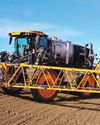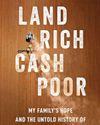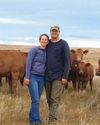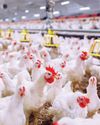
Experts will tell you Iowa is a little too far north and its growing season a little too short to double-crop and get two money crops from the same field in one growing season.
Cattle farmer Tony Baltes of Lisbon, Iowa, would argue the point. He’s developed a system that lets him plant and harvest two high-quality forage crops in the same year for cattle feed. In fact, you could even call it a quad-crop, or a double-crop of companion crops.
In the first half of the season, he grows oats and field peas together. After they’re harvested and ensiled, he seeds grain sorghum and soybeans together for the second crop.
Those forages provide the majority of the feed ingredients for his 65-head beef cow herd and a feedlot where the calves are finished. Most are sold as freezer beef to area customers.
Crop One: Oats and Field Peas
The oats and field peas are drilled together as early in the spring as weather allows. The field peas are a legume and fix nitrogen on their roots, which the oats, a grass crop, tap into. Oats give the field peas something to vine on. “They’re great companions,” says Baltes. “Some years, they’ll get shoulder high of lush forage.”
That double-crop is harvested in mid June, about the time the peas would be ready for a food crop. They’re either chopped or wet-baled and wrapped in plastic and ensiled. “We’ll typically harvest 5 or 6 tons per acre from that crop, and it will test about 20% protein, mostly from the peas,” says Baltes.
Crop Two: Grain Sorghum and Soybeans
Soon after the first harvest, in the last part of June, Baltes drills a mixture of soybeans and grain sorghum on the same acres. Those crops, also a legume and a grass, are excellent companions, too, with the grain sorghum getting a nitrogen bump. They both have drought-tolerant characteristics if the weather turns dry in August.
Esta historia es de la edición August 2024 de Successful Farming.
Comience su prueba gratuita de Magzter GOLD de 7 días para acceder a miles de historias premium seleccionadas y a más de 9,000 revistas y periódicos.
Ya eres suscriptor ? Conectar
Esta historia es de la edición August 2024 de Successful Farming.
Comience su prueba gratuita de Magzter GOLD de 7 días para acceder a miles de historias premium seleccionadas y a más de 9,000 revistas y periódicos.
Ya eres suscriptor? Conectar

Hagie's Sprayer, Built With Deere Tech
The Hagie STS16 with 120-foot boom comes factory-installed with John Deere See and Spray Premium.

No-Spring Hydraulic Press
Air-return shop press makes for easier positioning.

The Disappearing American Farmer
A new book examines this trend and how it can be stopped.

60-Year Partnership Still Going Strong
Gil Tinsey and Fred Hasen met in college and have been farming together in Michigan since the 1960s.

A NewGeneration Farm
Regenerative agriculture spurs growth at Sather Farm and Ranch.

Yields Increase With Lime
Managing soil pH could increase crop production.

Solar Harvest Coming to a Field Near You
More research and work is being done to expand the use of agrivoltaics in North America.

The Cost of Leadership
When parents won't make decisions, it’s difficult for farming heirs to set goals.

The Power of Artificial Intelligence
How animal agriculture is reaping the benefits of Al.

Shutdown
lowa plant is first casualty in USDA meat processing initiative.